With his executive action suspending the admission of refugees to the United States and temporarily halting the entry of citizens from a variety of Muslim countries, President Donald Trump set the United States on a disastrous course, argues Daniel Benjamin—one that threatens to weaken our national security and diminish American global leadership. This post originally appeared on Politico.
With his executive action suspending the admission of refugees to the United States and temporarily halting the entry of citizens from a variety of Muslim countries, President Donald Trump made a quick down payment on a key campaign promise. He also set the United States on a disastrous course—one that threatens to weaken our national security and diminish American global leadership.
The order signed on Friday calls for a temporary ban on visas for individuals from Iran, Iraq, Syria, Sudan, Libya, Yemen, and Somalia; a 120-day suspension of the resettlement of all refugees; and an indefinite ban on the resettlement of Syrian refugees.
It is hard to find any real basis for this action. During the campaign, Trump made frequent, unfounded claims that we have a “dysfunctional immigration system” and that unknown people are pouring through our borders. But over the past decade and a half, U.S. immigration enforcement has improved vastly to the point where it bears scant resemblance to the system whose vulnerabilities were exposed on 9/11. Travelers from all over the world are screened three or more times, with their names run through databases that draw on staggering amounts of intelligence and law enforcement information. The process flags all manner of misdeeds or suspicious information.
No system is perfect, so we will inevitably find a new shortcoming someday—possibly the hard way. We had one near-miss more than seven years ago on Christmas Day of 2009 with Umar Farouk Abdulmuttalab, the so-called “underwear bomber,” which led to another round of improvements in the visa process. Since then it has been doing an excellent job in keeping out those who would cause Americans harm.
There has not been a single terrorism-related death caused by foreign operatives coming into the country since 9/11. From Fort Hood to Orlando, jihadist killings have been the work of American citizens and green card holders. The strong consensus in the counterterrorism community remains that the principal danger today continues to come from homegrown extremists.
Insofar as there is rationale behind Trump’s move, it appears to come from a point he made about Omar Mateen, the day after he killed 49 at the Pulse Nightclub in Orlando:
“The killer, whose name I will not use, or ever say, was born in Afghan [sic], of Afghan parents, who immigrated to the United States…The bottom line is that the only reason the killer was in America in the first place was because we allowed his family to come here.”
Trump apparently believes that we should prevent Muslims from settling in the United States because they are destined to be the killers of tomorrow.
But this genetic argument is absurd. Though we do not have statistics exclusively for Muslims, immigrants as a group commit crimes at a lower rate than the native born, and in the U.S. that is true of second generation immigrants as well. What’s more, more than a third of terrorist crimes are committed by converts, and, in many years, more terrorist deaths are caused by native-born right wingers than jihadists. As a Triangle Center on Terrorism and Homeland Security Study report released today notes, in 2016—the bloodiest year since 2001—only one-third of one percent of all murders in the U.S. were attributable to terrorist violence by Muslim Americans. Since September 12, 2001, the total is about one two-hundredth of one percent. What kind of serious policy of exclusion can be based on such infinitesimal numbers, especially compared with the valued added to the U.S. by these immigrant communities? Trump is doing nothing but pandering to the Islamophobes in his base.
Trump, knowingly or not, is signaling to American Muslims that they are in for a protracted experience of discrimination and isolation.
While a real-world basis for this action is non-existent, the consequences of the order could be all too palpable. By cutting off immigration, albeit temporarily, from seven majority-Muslim countries and refusing to take more refugees from Syria, Trump, knowingly or not, is signaling to American Muslims that they are in for a protracted experience of discrimination and isolation. Already distressed by a presidential campaign that stoked anti-Muslim sentiments and ignited a wave of hate crimes, they will understandably be disturbed by measures that cut many in their communities off from foreign-based family and friends and that portend additional measures that may similarly affect others. (America’s Somali community, the newest, poorest and least integrated of the nation’s Muslim communities will be hit especially hard.)
The executive order is also likely to erode trust in the government, which will set back law enforcement’s efforts to build stronger bridges to Muslim communities. Those ties, as FBI Director James Comey has pointed out, are essential to U.S. domestic counterterrorism.
In fact, Trump’s action has the potential to trigger violence by individuals who are already leaning toward extremism, including some with mental illness. There are more than a few people who experienced personal setbacks, including ones in which officialdom was involved, who interpreted their experience through the prism of the jihadist narrative and took violent action.
Mohammed Bouyeri, who killed Dutch artist Theo van Gogh in the Netherlands in 2004, went over the edge in part because his funding request for a community program was turned down and then-Dutch parliamentarian Ayaan Hirsi Ali suggested screening Muslim job applicants for signs of extremism. Boston Marathon bomber Tamerlan Tsarnaev appears to have begun moving toward violence when he, a two-time New England boxing champion and a green card holder, was refused entry to the Golden Gloves tournament after new rules decreed only U.S. citizens were eligible. It would hardly be surprising if someone reacted to Trump’s executive order in a similar way.
We should also expect the order to anger Muslim partners around the world. Shutting the door on Iraqis, on whom we are relying in the ground fight against ISIL, isn’t going to help in that ongoing conflict. As one Iraqi asked on CBS news last night, “How is this our fault?..We are the victims. In fact, American ISIS fighters have come here.” At a moment when U.S. influence in the region is at a low ebb, and Russia, Iran and Turkey are collaborating in Syria and excluding the U.S., the American president should be concerned with building goodwill, not eroding it.
Beyond sending a negative message to Muslims around the world, the decision to stop resettlement of Syrian refugees bespeaks a meanness of spirit that is completely at odds with American values. Indeed, it’s almost unimaginable that today anyone would need to cite Emma Lazarus’s sonnet on the pedestal of the Statue of Liberty as a testament to what the nation has stood for, but perhaps things are just that upside down. Although Europe has a problem with uncontrollable surges of migrants, including many from Syria, the U.S. does not, nor has there been a case of Syrian extremists plotting violence here.
[T]he decision to stop resettlement of Syrian refugees bespeaks a meanness of spirit that is completely at odds with American values.
In fact, there is so much scrutiny of Syrian refugees that the federal bureaucracy, unprompted by any unwelcome incident, is reinvestigating several dozen Syrians who were admitted to the country even though their vetting was incomplete. (The errors were first discovered in 2015 and corrected last year.) And yet, despite that record, the Trump administration is determined to punish further the victims of the worst humanitarian crisis since World War II.
Pretty much anyone but Trump might see the post-election period, when the pressure of the political horse race is gone, as a moment for American leadership. Migration threatens the viability of the European Union as well as the political stability of American allies such as Jordan, Turkey, and others. Even beyond Syria, political turmoil and failing economies are driving migrants to leave their homes for safer, more prosperous countries.
The only way to deal with this genuinely global phenomenon is with a mixture of economic assistance to improve prospects in countries from which people are migrating and an international effort to apportion and resettle those who genuinely can’t go back—which would require the United States to resettle substantially more refugees than it was before Trump halved the number for the coming year. Of course, it’s not surprising that America’s least philanthropic billionaire—whose name is on scores of buildings used to make profits but on no university edifices, museums or concert halls—wants to pull up the ladder that so many have used over centuries to escape to a better life. And given that his “America First” slogan evidently means giving little or nothing to anyone else, it’s impossible to imagine Trump showing the farsightedness to supply urgent development assistance or to drive a solution for this catastrophe—actions that would bolster U.S. national security in the long run.
Does it need to be said again? Great countries don’t behave this way.
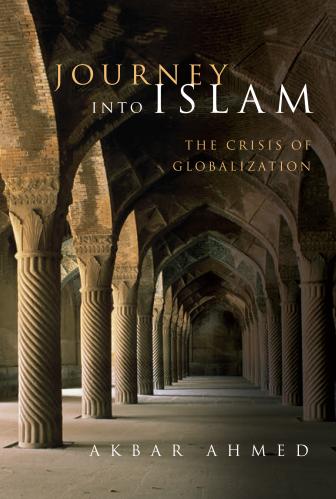
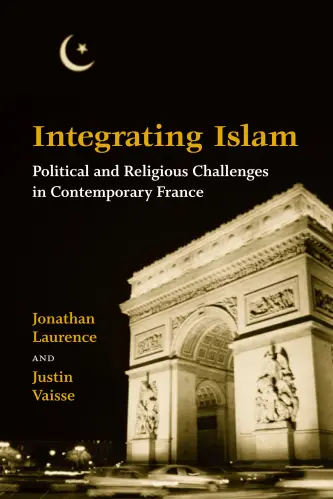

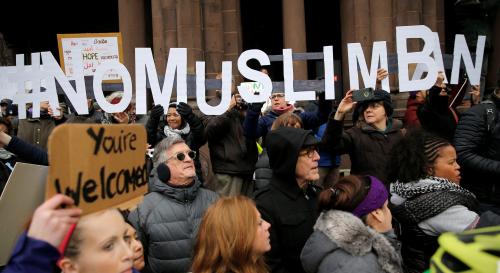
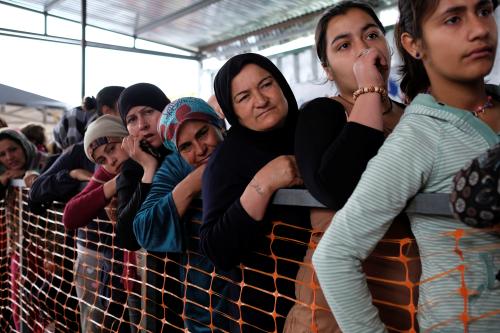



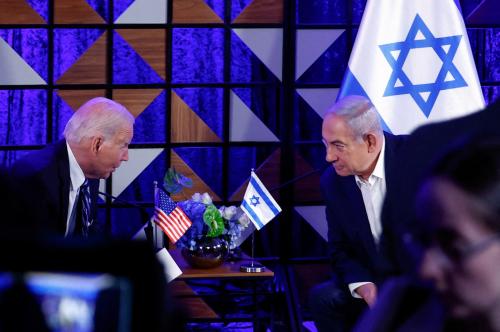

Commentary
How the new immigration rules might threaten our national security
January 31, 2017